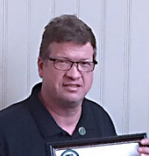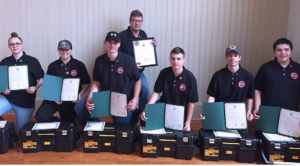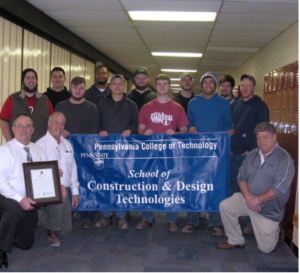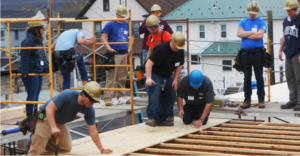
What Makes a Career and Technical Instructor?
Why do they choose to use the ICC’s High School Technical Training Program?

The International Code Council’s (ICC) code-training program, established for the career & technical education (CTE) system, has grown significantly since the original blueprint was visualized in 2011. The program has expanded from the original idea of a high school technical training program to a revision of the blueprint to include technical colleges.
The Code Council has come to recognize the level of expertise, dedication and professionalism that trades instructors of technical schools offer to students. The Code Council is pleased to be associated with instructors that possess construction knowledge and hands-on experience in all of the construction trades.
Over the coming year, we will introduce instructors from across the country. With this issue of the Building Safety Journal Online, let us introduce several instructors that have taught the International Residential Code (IRC) to their students for four or more years.
Svezzese was one of the original instructors involved in the development of the ICC High School Technical Training Program (HSTTP). I first met him in 2010 when we worked together on one of the homes the Harford Tech students constructed for Habitat for Humanity. Svezzese holds a Masters Degree Plus 30 (MA+30) in teaching and is an honorary member of PHI KAPPA PHI at the University of Maryland. His achievements include receiving a CTE Award of Excellence in Innovation from the Maryland Department of Education. He is a SkillsUSA trainer for Team Works, a curriculum writer for CTE programs, and created a facility management operations program this year to introduce students to careers as property and building managers. Svezzese has incorporated the International Property Maintenance Code (IPMC) in his new curriculum. The Code Council is developing an exam so his students can obtain an ICC Certificate of Achievement (COA) for this new program.
Svezzese’s experience in property maintenance and construction comes from 30 years as a vice president for Martins, Inc., a corporation managing multiple types of buildings and businesses throughout the state of Maryland. He was in charge of daily operations and overseeing construction along with maintenance of the company’s vast properties.
Svezzese understood the importance of teaching students the codes associated with their trade. He reviewed the Code Council’s HSTTP curriculum and pointed out how it complied with the Department of Education’s requirements for technical students’ CORE requirements. Many of his students graduate every year with two or more COAs, and 10 or more students graduate with all four COAs. He had the first student in the program pass the Code Council’s residential inspector’s exam and the IECC residential inspector and plans examiner exam. Currently, the HSTTP is offered to junior and senior students at Harford Tech. Starting next school year, the HSTTP will be offered to starting freshmen, and ICC anticipates an increase of students graduating with all four COAs.
Svezzese’s students incorporate the IRC into the homes, sheds and various projects they complete around the school. The students start their week with “ICC Monday” where they concentrate on learning how to navigate the code book.

WOONSOCKET DOES GREAT WORK
Our next group of instructors were introduced to the HSTTP by the Rhode Island Code Officials Association (RIBOA) that sponsors and mentors students and has an annual event called “TOOLS of the TRADE”.
Charles Myers has more than 35 years of experience in the construction industry, beginning his career as a cabinet maker, starting his own construction company and spending many years as a general contractor. He earned his teaching degree and started sharing his knowledge with the next generation of craftspeople.
Myers has always been at the forefront of new construction techniques and innovative materials. Recently, he conducted the first Rhode Island Lead Remediation Program for the area’s tech students.

He has received numerous awards for his outstanding dedication to his students: the 2001 Innovation in Education Award, 2002 Woonsocket Teacher of the Year, 2003 National Grid Pioneer in Education Award and the 2016 Rhode Island Career and Technical Teacher of the Year Award. In 2003, Myers was also the first CTE instructor to receive the coveted Milken Educator Award.
He is truly a craftsman of his trade, with a variety of his construction projects featured in Fine Homebuilding Magazine.
Myers continues to acquire education and certifications: Certified NCCER Instructor, Certified Lead RRP Instructor, Certified OSHA 10 and 30 Instructor, Energy Crafted Certified Builder, Energy Star Certified Builder, Member of the state Construction Curriculum Committee, and Member of the RI Education Committee.
PENNSYLVANIA COLLEGE OF TECHNOLOGY IS THE FIRST COLLEGE TO OFFER THE HSTTP

Harry Hintz is no stranger to understanding the construction business or what it takes to be successful in the industry. Hintz has a Bachelor of Science degree from Pennsylvania State University (Penn State) in the social service profession. For three years after graduating college he was a career counselor. One day, he looked out of his office window and watched a roofing contractor replace a roof on the building across the street. Hintz found it very interesting and decided that is what he wanted to do. He began researching to find what he needed for success in his newfound career. Hintz found that the Pennsylvania College of Technology (PCT) offered an Associate Degree in building construction. Within three months, he had a student workload or coursework and he earned his degree in an accelerated program in one year. He worked the next 14 years as a contractor, never advertising for work. Every job was a referral from a satisfied customer. In time, Hintz returned to PCT where he has remained the Building Construction Technology (BCT) instructor for the past 20 years.

Hintz contacted me in November 2014 about the HSTTP and inquired if the course could be adapted for use in his BCT program. I scheduled a presentation in Williamsport, Penn., and met with several instructors, along with Hintz and School of Construction and Design Technologies Dean Marc E. Bridgens. At the conclusion of our meeting, Hintz was willing to start the HSTTP as a pilot program.
As it’s said, the rest is history. I would like to share a portion of a letter we recently received from Hintz. He was writing to support the HSTTP as we submitted documentation to the Pennsylvania Department of Education to add the HSTTP to the approved trade curriculum list for CTE education.
SUCCESSFUL INSTRUCTORS

It is plain to see why the HSTTP is successful and welcomed in the technical schools at the high school and college level. The instructors are trades people with extensive experience who genuinely care about the industry and have a desire to share their experiences with the students. All of these men have something in common; it is their desire to give the technical student every advantage when they leave their classroom and enter the construction profession.
The Code Council welcomes instructors and appreciates their dedication to the students and the construction industry. For more information on the Code Council’s High School Technical Training Program, contact Jim Ellwood, career development liaison, government relations, at 1-888-ICCSAFE (1-888-422-7233), ext. 5701.








